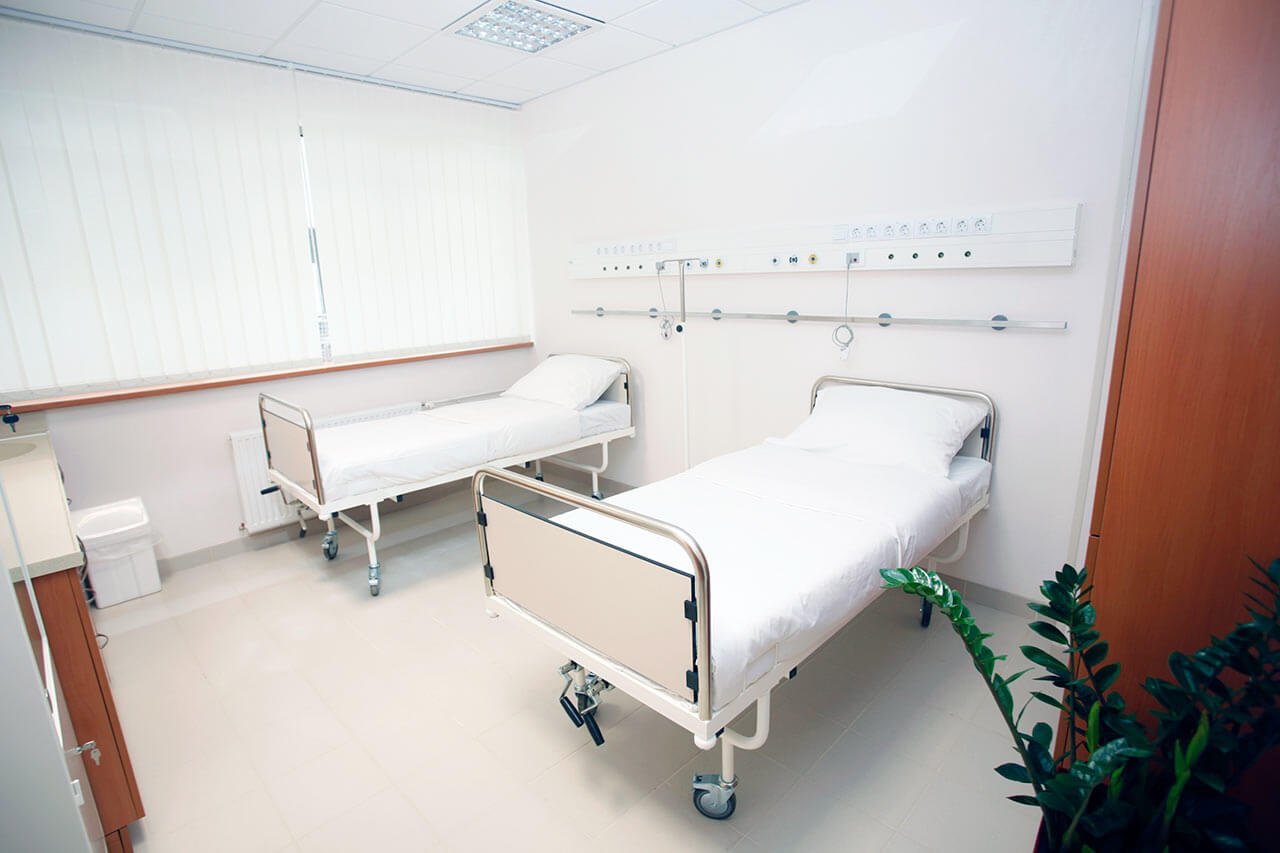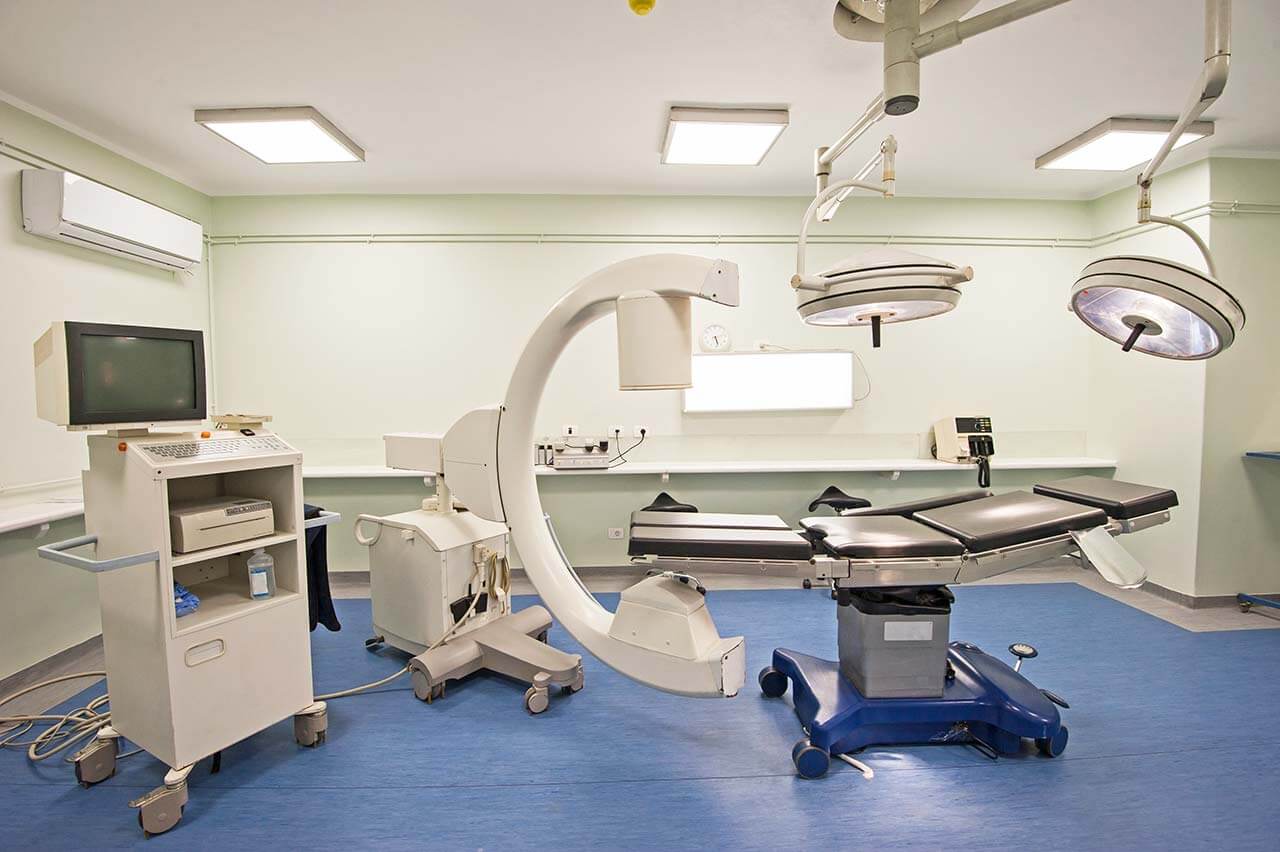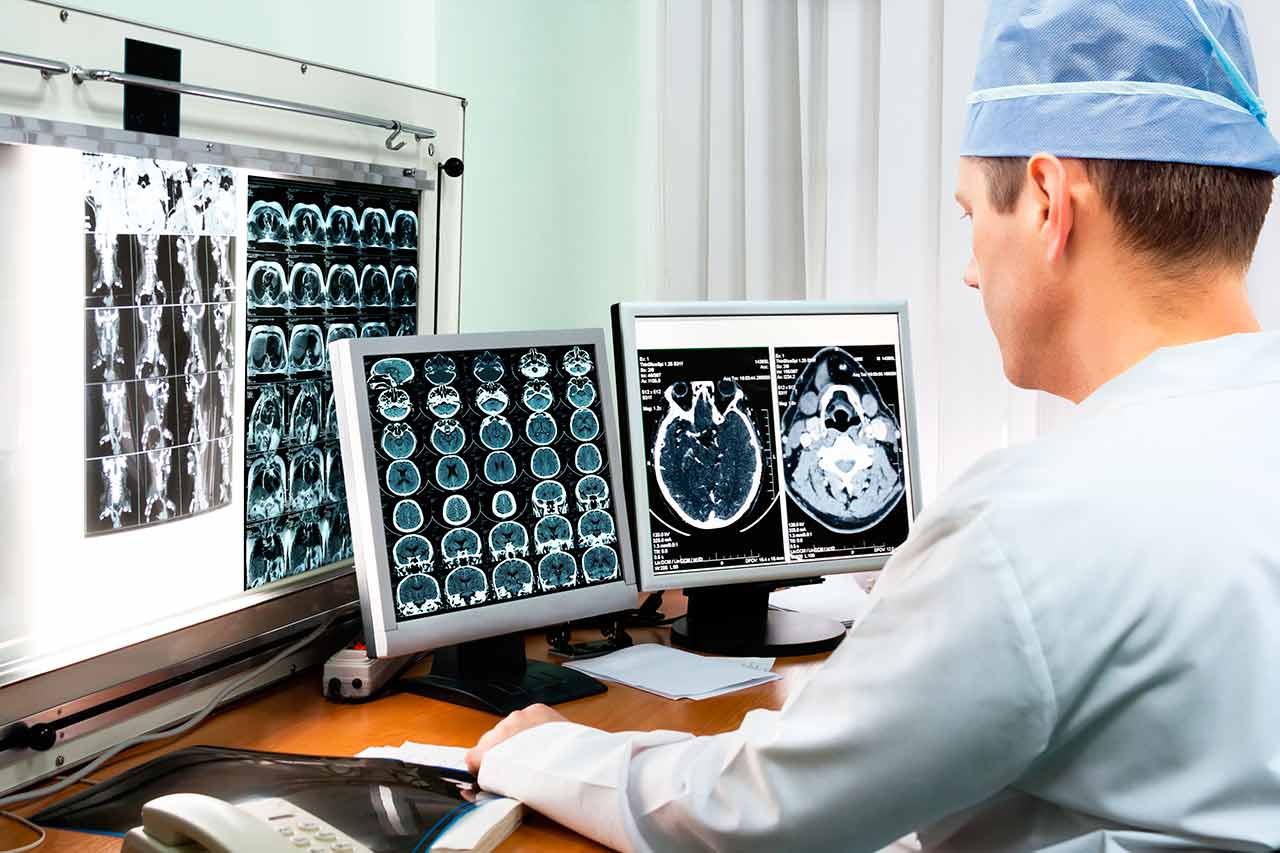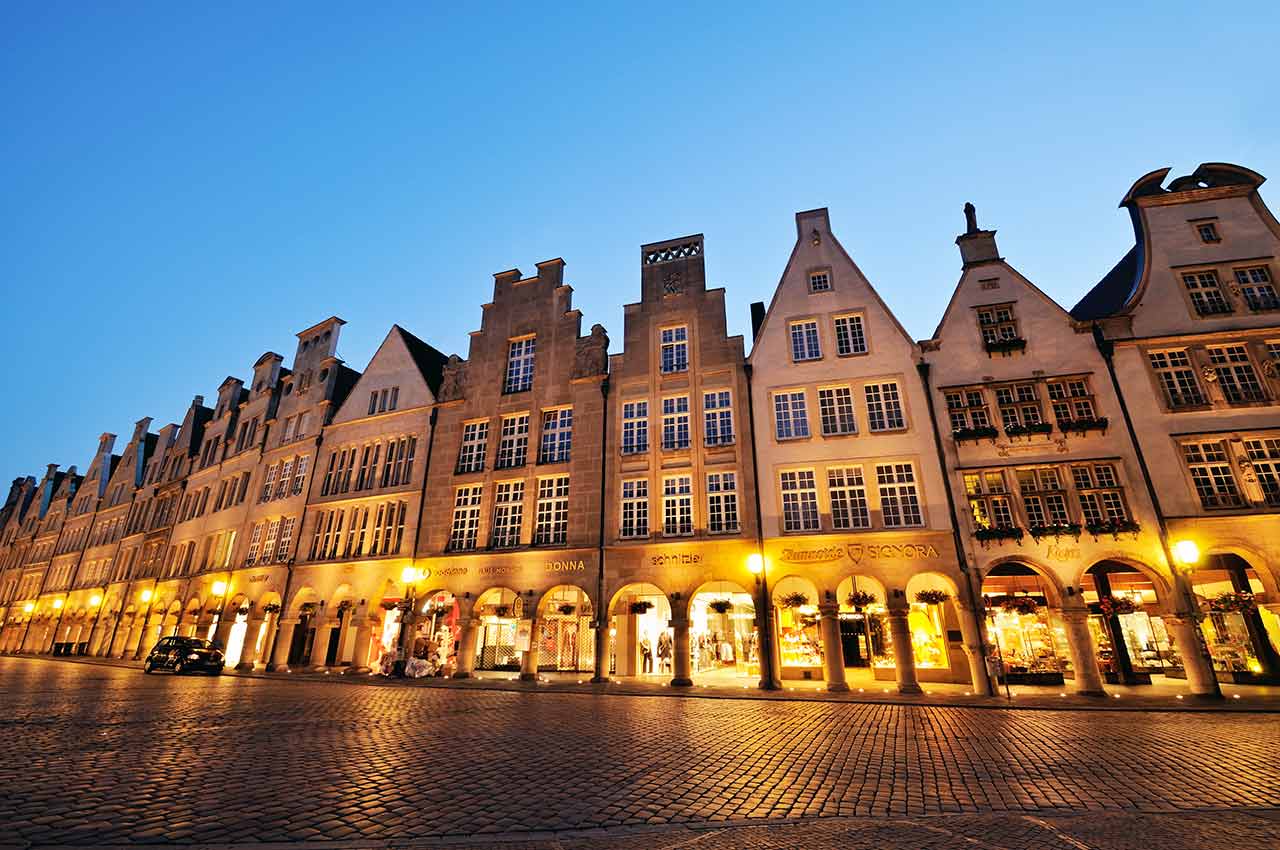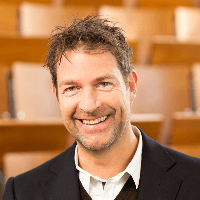
The program includes:
- Initial presentation in the clinic
- clinical history taking
- review of medical records
- physical examination
- laboratory tests:
- complete blood count
- general urine analysis
- biochemical blood test
- inflammation markers (CRP, ESR)
- blood coagulation analysis (aPTT, PT, INR)
- neurological examination
- electrophysiology study (if indicated clinically):
- ENMG (electroneuromyography)
- EEG (electroencephalography)
- SEPs (somatosensory evoked potentials)
- VEPs (visually evoked potentials)
- BAEP tests (brainstem auditory evoked potentials)
- CT/ MRI of the brain and spine
(if indicated clinically, additional cost is 650/1200€) - lumbar puncture
(if indicated clinically, additional cost is 1500 €) - nursing services
- consultation of related specialists
- treatment by chief physician and all leading experts
- explanation of individual treatment plan
(the cost of medicines is not included)
Required documents
- Medical records
- Brain and spinal cord MRI (if available)
Service
You may also book:
 BookingHealth Price from:
BookingHealth Price from:
About the department
According to the Focus magazine, the Department of General Neurology at the University Hospital Muenster ranks among the top German departments specializing in the treatment of multiple sclerosis and Parkinson's disease!
The department offers tremendous options for the diagnostics and treatment of nervous system diseases. The successful clinical practice of the department is based on the combination of unique qualifications of doctors, high competence of the medical staff and modern technical equipment. Medical care is provided in close cooperation with other specialized departments of the hospital, for example, with the Department of Neurosurgery, Radiology. Of particular importance is the treatment of complex and rare types of neurological diseases. The department is headed by Prof. Prof. h.c. Dr. med. Heinz Wiendl.
The department has all the necessary specialized sections for the provision of comprehensive treatment of patients with neurological diseases, for example, the Day Hospital, the Stroke Unit, the Intensive Care Unit, the specialized Epilepsy Center, the Neurogenetic Laboratory, the Neurosomological Laboratory, the Electrophysiological Laboratory, etc. Therefore, the department has optimal conditions for the top-class medical care of patients in accordance with the international medical standards.
The service range of the department includes:
- Diagnostics and treatment of amyloidosis
- Diagnostics and treatment of amyotrophic lateral sclerosis
- Diagnostics and treatment of (auto)immune encephalitis
- Anti-NMDA receptor encephalitis
- Encephalomyelitis
- Limbic encephalitis
- Brainstem encephalitis
- Cerebellite
- Morvan syndrome
- Acquired neuromyotonia
- Diagnostics and treatment of chronic progressive hereditary neuropathies
- Diagnostics and treatment of inflammatory nervous system diseases
- Multiple sclerosis
- Acute disseminated encephalomyelitis
- Retrobulbar neuritis
- NeuroAIDS
- Rheumatism affecting the nervous system
- Diagnostics and treatment of inflammatory neuromuscular diseases
- Myasthenia
- Myopathy
- Inflammatory polyneuropathies
- Diagnostics and treatment of epilepsy
- Diagnostics and treatment of memory disorders
- Diagnostics and treatment of Fabry disease
- Diagnostics and treatment of Pompe disease
- Ultrasound examination of the nerve endings and muscles
- Neurogenetics
- Diagnostics and treatment of neuromuscular diseases
- Diagnostics and treatment of brain and spinal cord tumors (neuro-oncology)
- Diagnostics and treatment of Parkinson's disease, other motor disorders
- Diagnostics and treatment of sleep disorders
- Diagnostics and treatment of stroke and other neurovascular diseases
- Diagnosis and treatment of swallowing disorders
- Diagnostics and treatment of vasculitides and inflammatory processes in the blood vessels
- Other medical services
Curriculum vitae
Education
- 1997 Admission to medical practice.
- 1989 - 1996 Study of Human Medicine at the Universities of Erlangen, Basel and Duke University.
Degrees
- 2004 Doctoral thesis defense. Subject: "Immune regulation in muscle tissue: significance for the immune pathogenesis of inflammatory myopathies".
- 1996 Doctoral Degree.
Academic Positions
- 2013 Professor and Head of the Department of General Neurology, University Hospital Muenster, Germany.
- 2010 Professor and Head of the Department for the Treatment of Inflammatory Nervous System Diseases and Neuro-Oncology, University Hospital Muenster, Germany.
- 2005 - 2010 Professor of Neurology, Head of the Group on Clinical Researches on Multiple Sclerosis and Neuroimmunology, Department of Neurology, University of Würzburg.
- 2004 Leader, Junior Research Group on Neuroimmunology, Interdisciplinary Clinical Research Center in Tuebingen, Germany.
- 2000 - 2004 Clinical and Research Fellow of the Hertie Brain Research Institute, Department of Neurology, University of Tuebingen.
- 1998- 2000 German Research Foundation Scholarship, Max Planck Institute of Neurobiology, Department of Neuroimmunology, Martinsried (Prof. Dr. med. H. Wekerle; Prof. Dr. med. R. Hohlfeld).
- 1997 - 1998 Research Fellow, Institute of Anatomy and Neuroanatomy II, University Erlangen-Nuremberg.
- 1996 - 1997 Residency Program, Department of Neurology, University Erlangen-Nuremberg.
Awards and Honors
- 2009 Heinrich Pett Prize of the German Society of Neurology.
- 2004 Sobek Award for research on multiple sclerosis (Young Scientists Award) of the German Multiple Sclerosis Association.
- 2003 Felix Jerusalem Prize of the German Society of Muscular Diseases.
Special Positions
- 2015 Editorial Board Member of the Neurotherapeutics Journal.
- 2015 Commission Member "Perspectives for the treatment of patients in Neurology" of the German Society of Neurology.
- 2014 Member of the Academy of Education and Training, Medical Association of Westphalia-Lippe.
- Board Member, Felgenhauer Foundation for Young Neuroscientists
- 2013 Executive Board Member and Chairman of the Neuromedicine Foundation, Muenster.
- 2013 Editorial Board Member of PLOS ONE.
- 2013 Principal Investigator of the Cells-in-Motion Cluster of Excellence (funded by the German Research Foundation and the German Council of Science and Humanities ).
- 2013 Dean, Responsible for Research Activities and Training of Young Scientists, Faculty of Medicine, University of Muenster.
- 2012 Co-Spokesperson of the Transregional Collaborative Research Center 128 "Multiple Sclerosis" (Rhein-Main, Muenster, Munich), funded by the German Research Foundation.
- 2012 Steering Committee Member of the Cells-in-Motion Cluster of Excellence, Muenster (funded by the German Research Foundation).
- 2012 Board Member of the Interdisciplinary Centre for Clinical Research, Muenster.
- 2011 Board Member of the German Society for Neurologists.
- 2009 Official Spokesman of the National German Competence Network of Multiple Sclerosis.
- 2010 Commission Member on Drugs of the German Medical Association.
- 2008, 2014 Coordinator: Therapeutic Recommendations of the German Society for Neurology (myositis, myasthenia).
- 2008 Review Committee Member of the Competence Cluster for Autoimmune Diseases, National Institutes of Health.
- 2008 Coordinator of the Task Force on Neurology.
- 2007, 2011 Executive Board Member of the German Multiple Sclerosis Society.
- 2007 Editorial Board Member of the Journal of Neuroinflammation.
- 2006 Editorial Board, International of the Journal of Clinical Practice.
- 2004 Scientific Advisory Committee on HLA-G International Conferences.
- 2003 Scientific Advisory Committee of the German Society for Muscular Diseases.
- 2002 Member of the Medical Council of the German Society for Multiple Sclerosis.
- 2001, 2012, 2014 Member of the Multiple Sclerosis Therapy Consensus Group (MSTCG).
Photo of the doctor: (c) Universitätsklinikum Münster
About hospital
According to the Focus magazine, the University Hospital Muenster ranks among the top German hospitals!
The hospital belongs to the most prestigious medical institutions in Germany. The hospital is distinguished by a high professionalism of its doctors, state-of-the-art technological equipment and the availability of the most advanced diagnostic and therapeutic capabilities ensuring the first-class medical services. The hospital integrates more than 30 specialized departments, as well as numerous institutes and centers, thus representing all the specialties of modern medicine. The hospital treats more than 64,000 inpatients and 500,000 outpatients every year, which is an indisputable evidence of the highest quality of medical services.
The medical team of the hospital, consisting of more than 10,000 employers, is committed to preserving the physical health of patients, providing them with psychological support and compassionate attitude throughout the entire therapeutic process.
The hospital has succeeded in all specialties of medicine, however, main areas of its specialization include oncology, treatment of cardiovascular, neurological diseases, transplant medicine, psychiatry and psychosomatics, pediatrics with a special focus on rare diseases in children, traumatology, orthopedics, prenatal medicine, and reproductive medicine. In addition, key importance is given to scientific research and training of medical students, so that the specialists of the hospital make a momentous contribution to the development of medicine as a whole.
Photo: (с) depositphotos
Accommodation in hospital
Patients rooms
The patients of the University Hospital Muenster live in single or double rooms. The rooms are made in bright colors and modern design. Each room has an ensuite bathroom with shower and toilet. The standard room includes an automatically adjustable bed, a bedside table, a table and chairs for receiving visitors, a telephone and a TV. The hospital offers access to the Internet. If desired, the patient can also stay in the enhanced-comfort room.
Meals and Menus
The patients of the hospital are offered a tasty and balanced three meals a day: breakfast, lunch and dinner. The menu always features diet and vegetarian dishes. If for any reason you do not eat all the food, you will be provided with an individual menu. Please inform the medical staff about your dietary preferences prior to the treatment.
Further details
Standard rooms include:
Religion
Religious services are available upon request.
Accompanying person
During the inpatient program, an accompanying person may stay with you in a room or at the hotel of your choice.
Hotel
During the outpatient program, you can live at a hotel of your choice. Managers will help you to choose the most suitable options.
The hospital offers a full range of laboratory tests (general, hormonal, tests for infections, antibodies, tumor markers, etc.), genetic tests, various modifications of ultrasound scans, CT scans, MRI and PET / CT, angiography, myelography, biopsy and other examinations. Treatment with medications, endoscopic and robotic operations, stereotaxic interventions is carried out here, modern types of radiation therapy are also used. The hospital offers patients all the necessary therapeutic techniques.
- Stereotactic radiotherapy, including intracranial one
- Thulium and holmium laser enucleation of the prostate
- HIPEC for peritoneal cancer
- Imlantation of mechanical heart support systems
- Assisted reproductive technologies
These are arthrosis and sports injuries of the joints, benign neoplasms and malignant tumors of various localizations, spinal injuries, osteoporosis, benign prostatic hyperplasia, urolithiasis, inflammatory bowel disease and other pathologies.
- Traumatology and hand surgery
- Urology
- General and abdominal surgery
- Cardiology and cardiac surgery
- Obstetrics and gynecology
The hospital's team consists of more than 10,000 highly qualified employees.
